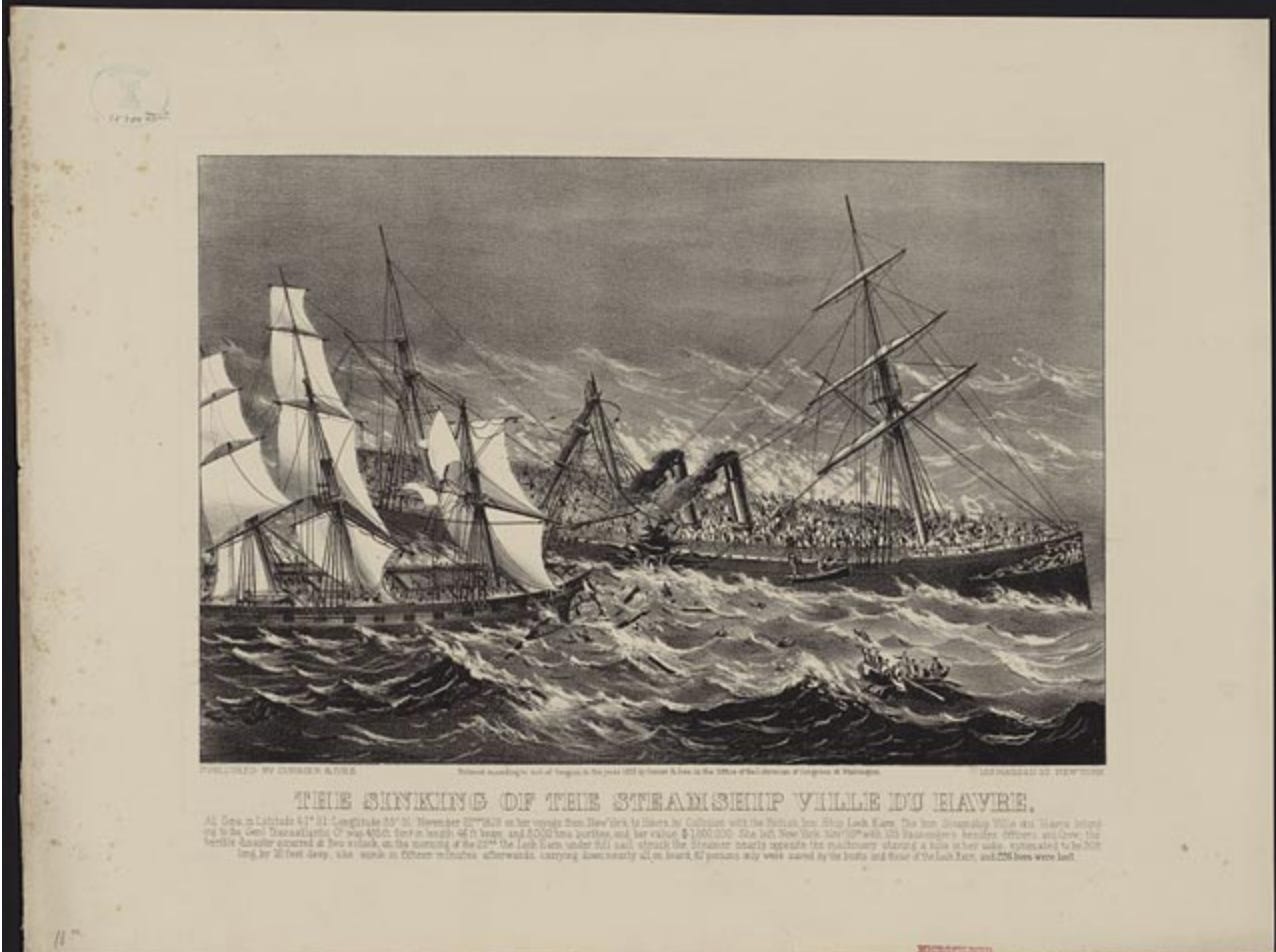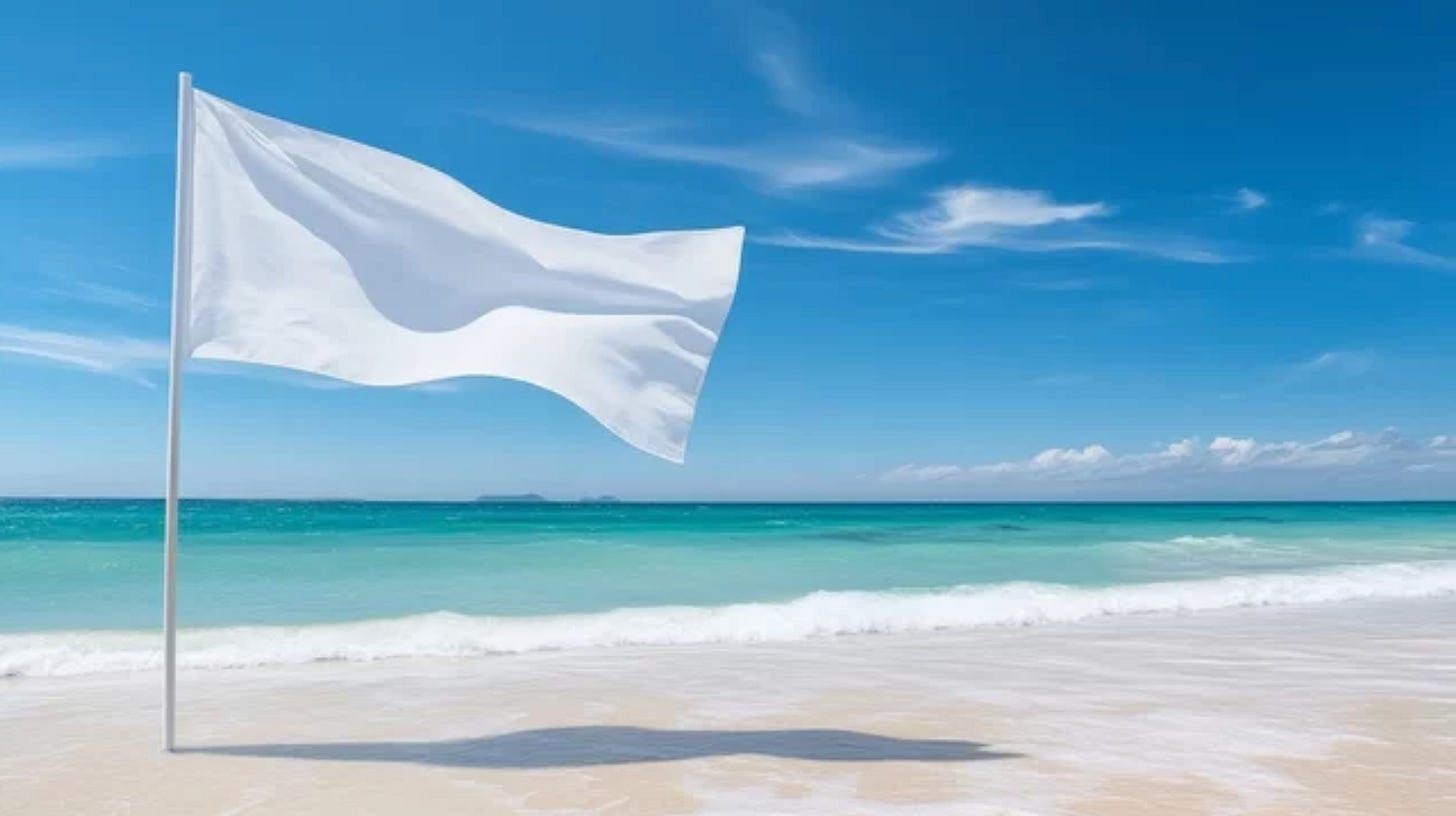When the current pulls against you, surrender might be your path back to shore.
It started with a spark.
Not the gentle kind that warms a gathering of friends, but the sharp, hot kind that catches uninvited and threatens to consume more than you're willing to lose.
Have you felt it? That primal urge to defend yourself no matter the cost? The heat rising in your chest, words forming rapidly—a perfect counter-argument ready for battle.
Situations in my life have ignited that very response in me. Like a dog with a bone, I found my jaws locked around perceived injustices, my teeth sunk deep into the need to defend my position, my reputation, my very self.
Yet beneath the surge of righteous indignation, I felt it—that gentle, persistent nudge of the Spirit asking me to do the one thing that felt impossible:
Let go of my need to defend myself.
But how do you know when it's time to stop fighting?
When the Sea Becomes a Teacher
The urge to fight back reminded me of my childhood along the shores of south Florida, where the beaches were as beautiful as they were treacherous. The ocean there wasn't just my playground—it was my classroom. From the time my feet could touch the sand, I was schooled in the dangers of rip currents.
"Don't fight it," my father would say, his eyes serious as they scanned the horizon. "If you're caught, you'll tire yourself out and drown. The current is stronger than you are."
I remember standing at the shoreline, watching the seemingly innocent surface, knowing that beneath it ran invisible rivers capable of carrying even the strongest swimmers out to sea. Now, decades later, I found myself caught in different currents—ones that pulled at my peace, my patience, and my perspective.
With every remembered slight, every misunderstood intention, every moment where I felt the sting of being dismissed or discounted, I felt the pull to swim against the tide, to exhaust myself in futile self-defense. The question kept returning: When do we know it's time to stop fighting for our own vindication?
The Sacred Art of Letting Go
Then God reminded me of Psalm 46, which offered both comfort and a clear answer to my question.
"God is our refuge and strength,
a very present help in trouble.
Therefore we will not fear though the earth gives way,
though the mountains be moved into the heart of the sea,
though its waters roar and foam,
though the mountains tremble at its swelling. Selah (Psalm 46:1-3, ESV)"
I let the ancient words wash over me, reaching the passage that held the key:
"Be still, and know that I am God.
I will be exalted among the nations,
I will be exalted in the earth!" (Psalm 46:10, ESV)
Be still.
I always thought these words were simply an invitation to quiet contemplation, but the Hebrew word for be still, rapha, reveals something deeper. Rapha is an imperative verb, meaning it is a direct instruction from God: let go, cease, release.
Robert Alter, a professor of Hebrew, suggests a more accurate translation might be: "Let go and know I am God."
What makes this particularly striking is that the same Hebrew word rapha is used in contexts of surrender during warfare. In Joshua 10:6, it describes "relaxing one's hand" or ceasing to fight. The psalmist is literally calling us to drop our weapons in the face of conflict. The surrounding verses in Psalm 46 confirm this, describing God breaking the bow and shattering the spear (v. 9). The call to rapha isn’t a call to contemplative retreat—it’s a call to lay down arms, to stop fighting battles that belong to God.
Like so much of God’s kingdom, the command to rapha requires a response from us. Surrender is not something that happens to us—it’s something we choose.
Rapha invites us to loosen our grip, unclench our fists, and stop defending, striving, and scrambling. It asks us to release our need to be right, to be seen, to be safe on our own terms and trust that God is strong enough to do what we cannot.
In the Ancient Near East, when a king proclaimed "I will be exalted among the nations," it was typically after military victory. Here, God declares His sovereignty not after we've fought for Him, but after we've surrendered our own fights to Him.
Let go.
The words landed like a stone dropped in still water, sending ripples across the surface of my heart. God wasn't asking me to arrange myself in a posture of serene meditation. He was asking for my surrender—for me to drop the weapons of self-defense, unclench my fists, loosen my white-knuckled grip on my need to be right.
I recognized that it was indeed time to release myself from the exhausting cycle of self-protection that held me captive.
The Surprising Science of Surrender
Not long ago, scientists discovered something surprising about surviving rip currents. The conventional wisdom had always been to swim parallel to the shore—a strategy still valid in some cases. But oceanographic research revealed another approach: if a swimmer can stay calm and relax, though it might feel like a long time, perhaps three minutes or so, they'll generally float back to the beach on their own.
Many rip currents—roughly 80 to 90 percent according to some studies—flow in circular patterns, from the shallows, out through the breakers and back again, every few minutes. The most counterintuitive response, surrendering to the current, often leads you safely back to shore.1
Strangely, what scientists discovered in the sea echoes what the psalmist proclaimed long before: peace isn’t always found in resistance, but in surrender. Psalm 46 was likely written during one of Israel’s darkest hours, when enemies surrounded Jerusalem and destruction seemed imminent. The imagery of "mountains falling into the sea" and "waters roaring and foaming" (verses 2-3) were metaphors for political and social upheaval that threatened to overwhelm God's people.
Yet, in this chaos, the psalmist points to "a river whose streams make glad the city of God" (verse 4)—a reference to the gentle Gihon spring that provided Jerusalem with water even during siege. Unlike the threatening waters outside the city, this river brought sustenance.
Our lives often feel hijacked by unwelcome currents, conversations that pull us into defensiveness, circumstances that sweep us toward anxiety, relationships that drag us into the deeper waters of our insecurities. We flail and fight, desperate to regain control, when perhaps what God is whispering is: Stop defending yourself. Start trusting me.
How do we know when it's time to let go?
Perhaps it's when the need to defend ourselves costs more than we can afford to pay—when it drains our peace, disturbs our sleep, distances us from God, and exhausts our spirits.
Can you hear it? That gentle invitation to loosen your grip on whatever you're holding so tightly it's leaving marks on your palms?
What would it mean for you to trust God enough to release that thing, that relationship, that hurt, that need to be understood or vindicated, into His capable hands?
What freedom might you find in finally setting down the exhausting work of self-defense?
Surrender in Three Miles of Grief
Psalm 46 is well known as the psalm that inspired Martin Luther to write A Mighty Fortress is Our God. Another man found similar comfort in its truths, penning words that have carried countless souls through their own raging seas.
Horatio Spafford knew currents of grief most of us will never experience. In 1870, he and his wife Anna lost their four-year-old son to scarlet fever. A year later, the Great Chicago Fire devoured their real estate investments. Seeking respite from their sorrows, Horatio planned to take his family to England, but business matters delayed him. He sent his wife and four daughters ahead, promising to follow soon.
Days later, a telegram arrived from his wife: "Saved alone."
Their ship had collided with another vessel. All four daughters—Anna, Maggie, Bessie, and Tanetta—were lost to the depths of the Atlantic.2

Boarding the next ship to join his bereaved wife, Horatio stood on deck as the captain called him to the bridge.
"A careful reckoning has been made," the captain said, his voice quiet with the weight of the words. "I believe we are now passing the place where the 'de Havre' was wrecked. The water is three miles deep."
Three miles of water. Three miles between a father and his daughters' final resting place. Three miles of impossible distance.
Returning to his cabin, buffeted by both the literal sea and the waves of his own grief, Horatio took out a pen and began to write—not bitter words of accusation against God, but a hymn of soul-wrenching surrender:
When peace, like a river, attendeth my way,
When sorrows like sea billows roll;
Whatever my lot, Thou hast taught me to say,
It is well, it is well with my soul.
What allows a man standing over the watery grave of his children to pen such words? What current of grace runs deeper than the ocean itself?
The next verse reveals the source:
My sin—oh, the bliss of this glorious thought!—
My sin, not in part but the whole,
Is nailed to the cross, and I bear it no more,
Praise the Lord, praise the Lord, O my soul!
The Cross, Where Our Striving Ends
Psalm 46 closes with a striking image of disarmament: “He makes wars cease to the ends of the earth. He breaks the bow and shatters the spear; He burns the shields with fire” (verse 9). This prophetically points to what Jesus accomplished, not through military might, but through absolute surrender on the cross.
The cross stands like an anchor, fixed deep beneath the surface of our faith. It remains unmoved by swells of fear, misunderstanding, or our desperate attempts to control the narrative. It was there, suspended between earth and heaven, that Jesus uttered the words, “It is finished,” not as a cry of defeat, but as a declaration of victory.
When Jesus cried "It is finished" (John 19:30, ESV), He used the Greek word tetelestai, an accounting term meaning "paid in full." In that moment, He paid the debt of sin and removed our need to defend ourselves before God or others.
Because our sins are nailed to that cross, we can loosen our grip on all we believe we must hold onto and rest in the finished work of Christ.
The freedom we find in this surrender is like taking off armor we've carried for too long. Suddenly, we can breathe and move without the constant weight of self-protection. Eventually, God’s rhythm of grace brings us safely back to shore.
The cross is God's invitation to cease striving and relax into a persistent peace, provided not by our work or worry, but by the blood of Jesus.
The situations that first sparked my defensive posture have not disappeared. The people who misunderstood me have not suddenly gained perfect clarity. Yet something in me has shifted. I’m no longer gripping tightly like a dog with a bone, determined to protect my position at all costs. I've loosened my grip, relaxed into the current, and found myself moving not away from safety, but back toward it.
What about you? What are you holding onto so tightly today that your fingers ache with the effort? What might happen if you uncurled those fingers, one by one, and yielded to God’s whisper of rapha—His call to let go and trust?
God stands at the shore, watching your approach, knowing that the current of His grace is already bringing you home. The freedom of release awaits you there.
Is God calling you to let go of your need to defend yourself right now? What might that release look like in your life today?
While many rip currents do circulate back to shore, safety experts still recommend swimming parallel to the shore when possible. Always follow beach warning flags and consult local lifeguards for safety information.
It Is Well: The Story of Horatio and Anna Spafford by Troi Penwell
Disclosure: As an Amazon Associate, I earn from qualifying purchases. This post may contain affiliate links, which means I may receive a small commission at no additional cost to you if you make a purchase through these links. Thank you for supporting this ministry.












All I can say is WOW! Your wise words really spoke to me. Something has definitely shifted for me. Thanks for sharing this. I'm currently in a season where God is repeatedly asking me to surrender control to him. Particularly when it comes to my health. All my attempts at control have been futile. I have only succeeded in getting more and more depressed. I may not know what He is doing but I know what He has done. I need to relax (my word for 2025) and surrender. He has never let me down and I trust that He is carrying me even now.
Great thoughts Kim. "It is well with my Soul" is one of my favorite hymns.